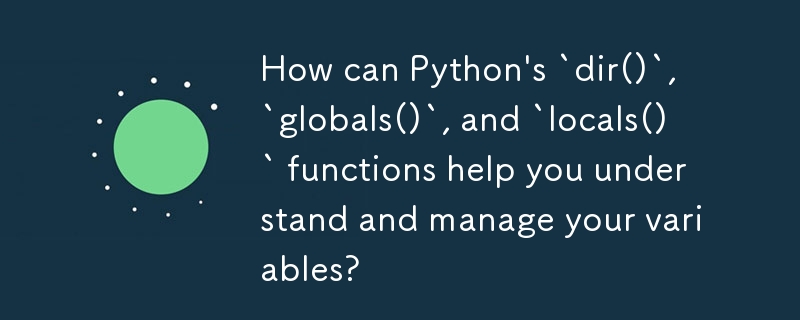Home >Backend Development >Python Tutorial >How can Python\'s `dir()`, `globals()`, and `locals()` functions help you understand and manage your variables?
How can Python\'s `dir()`, `globals()`, and `locals()` functions help you understand and manage your variables?
- Susan SarandonOriginal
- 2024-10-31 03:07:31403browse

Dive into the World of Variables with Python's Debugger and Vocabulary Checkers
Navigating the realm of variables and their values can be a daunting task, especially in complex coding projects. Python provides multiple tools to simplify this process, allowing you to effortlessly view defined variables at any given point.
Unveiling the List of Defined Variables
One of Python's most powerful features is the dir() function. When invoked, dir() returns a list of all in-scope variables. This is particularly useful when working in interactive mode, as it provides a quick overview of available variables, avoiding name collisions and ensuring efficient coding practices.
Delving into Global and Local Variables
In addition to dir(), Python offers two essential functions for examining variables: globals() and locals(). These functions return dictionaries containing the global and local variables, respectively. By accessing these dictionaries, you can inspect their keys and values, gaining deeper insights into the program's variables' scope and relationships.
Example Usage
Consider the following Python code:
<code class="python">a = 5
b = 10
def check_variables():
c = 3
d = 4
print(f"In the check_variables() function:\n{dir()}")
print(f"Global variables:\n{globals()}")
print(f"Local variables:\n{locals()}")
check_variables()</code>
When this code is executed, the following output is generated:
In the check_variables() function:
['__annotations__', '__builtins__', '__cached__', '__doc__', '__file__', '__loader__', '__name__', '__package__', '__spec__', 'a', 'b', 'c', 'd']
Global variables:
{'__annotations__': {}, '__builtins__': <module 'builtins' (built-in)>, '__cached__': True, '__doc__': None, '__file__': '/Users/username/test.py', '__loader__': <_frozen_importlib.BuiltinImporter object>, '__name__': '__main__', '__package__': None, '__spec__': None, 'a': 5, 'b': 10}
Local variables:
{'c': 3, 'd': 4}
As you can observe, dir() lists all variables in scope within the check_variables() function, including the global variables a and b. globals() provides information about global variables, while locals() displays local variables defined within the function. This separation helps you understand the variable's accessibility and lifetime, preventing accidental modifications of global variables from within local functions.
Conclusion
Mastering these variable exploration techniques in Python empowers you to work more efficiently and accurately. dir(), globals(), and locals() become indispensable tools for inspecting variables and gaining a comprehensive view of your code's functionality. Combined with these debugging mechanisms, Python's User-Defined Functions (UDFs) provide an additional layer of control for solving complex programming problems.
The above is the detailed content of How can Python\'s `dir()`, `globals()`, and `locals()` functions help you understand and manage your variables?. For more information, please follow other related articles on the PHP Chinese website!

